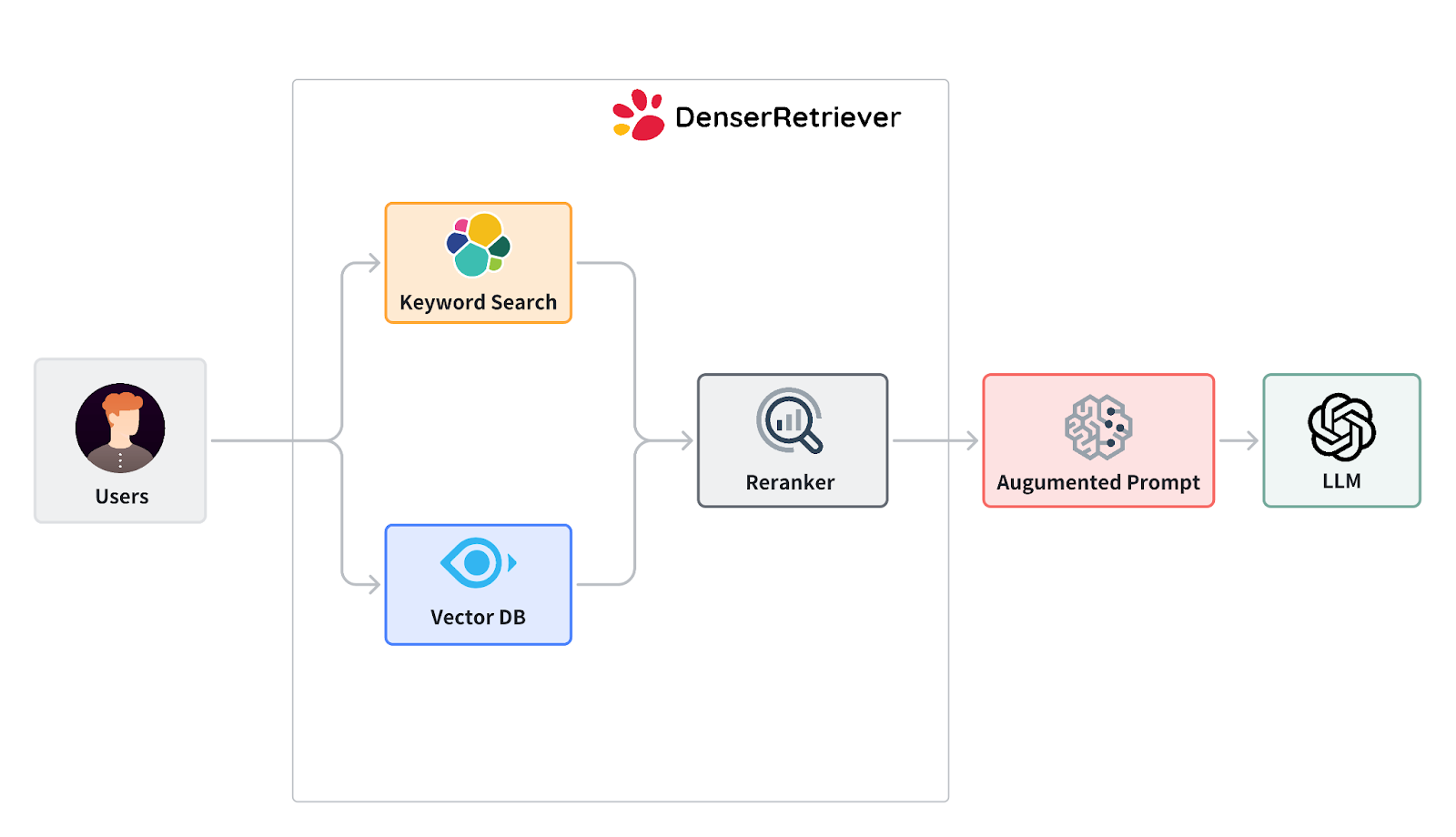
How Does Enterprise Search Work?

Enterprise search solutions help businesses find information quickly by indexing data from multiple data sources. The process begins with scanning and cataloging data, known as crawling.
The search tool collects data from databases, documents, emails, and other repositories, indexing and organizing it for easy retrieval.
When an employee enters a search query, the search solution uses algorithms to find the most relevant results. These algorithms consider keyword relevance, document importance, and user behavior, ensuring that the most pertinent information appears at the top of the search results.
Modern enterprise search software tools often use natural language processing (NLP). NLP helps the search tool understand the context of queries better.
If someone searches for "annual report," NLP determines whether they want the most recent report or reports from specific years.
Different Types of Enterprise Search Solutions#
Depending on your business needs, the size of your organization, and how your data is stored, one type of search solution may serve you better than another. Here’s a breakdown of the most common types:
Siloed Search#
In a siloed search system, each department or tool has its own search function. Your team might have to search your document storage, CRM, and helpdesk separately to find related information.
This setup is common in businesses that rely on multiple disconnected platforms. But it’s also the least efficient, often leading to missed information and duplicated work.
Federated Search#
Federated search connects those silos by allowing users to search multiple systems at once. The results still come from separate sources, but they’re presented together in a single search interface.
It’s a step up from siloed search, which reduces time spent switching between tools. However, it doesn’t always allow for deep filtering or true content blending.
Unified Search#
Unified search takes things further by indexing and combining data from different systems into a single, searchable database. Users can get truly consolidated results, regardless of where the original data lives.
It’s more efficient than federated search and enables richer filtering, ranking, and user experience. Most modern enterprise search platforms aim for this model.
AI-Powered Search#
AI-powered search improves either federated or unified systems by understanding context, intent, and language. Rather than just matching keywords, it learns from user behavior and delivers smarter, more relevant results.

Over time, it adapts to patterns and helps your team find the right content, even if they don’t know what they’re looking for.
Key Features of Enterprise Search Solutions#
A good enterprise search solution goes beyond just delivering search results. It should help your team find the right information with less effort.
Whether you’re choosing a tool for a small team or a global organization, here are the key features you should expect from a modern enterprise search platform:
Centralized Search Across Multiple Data Sources#
One of the most essential features of any enterprise search solution is its ability to connect and index content from various repositories. This includes document management systems, intranets, cloud storage, CRMs, email servers, knowledge bases, and databases.
Instead of searching each system individually, users can enter a query once and receive results from all connected systems in a single view. This saves time and eliminates information silos, and improves knowledge sharing across departments.
Role-Based Access and Data Security Controls#
Because enterprise search often spans sensitive and proprietary content, it must enforce strict access controls. Role-based permissions make sure employees only see results they’re authorized to access based on department, job title, or clearance level.
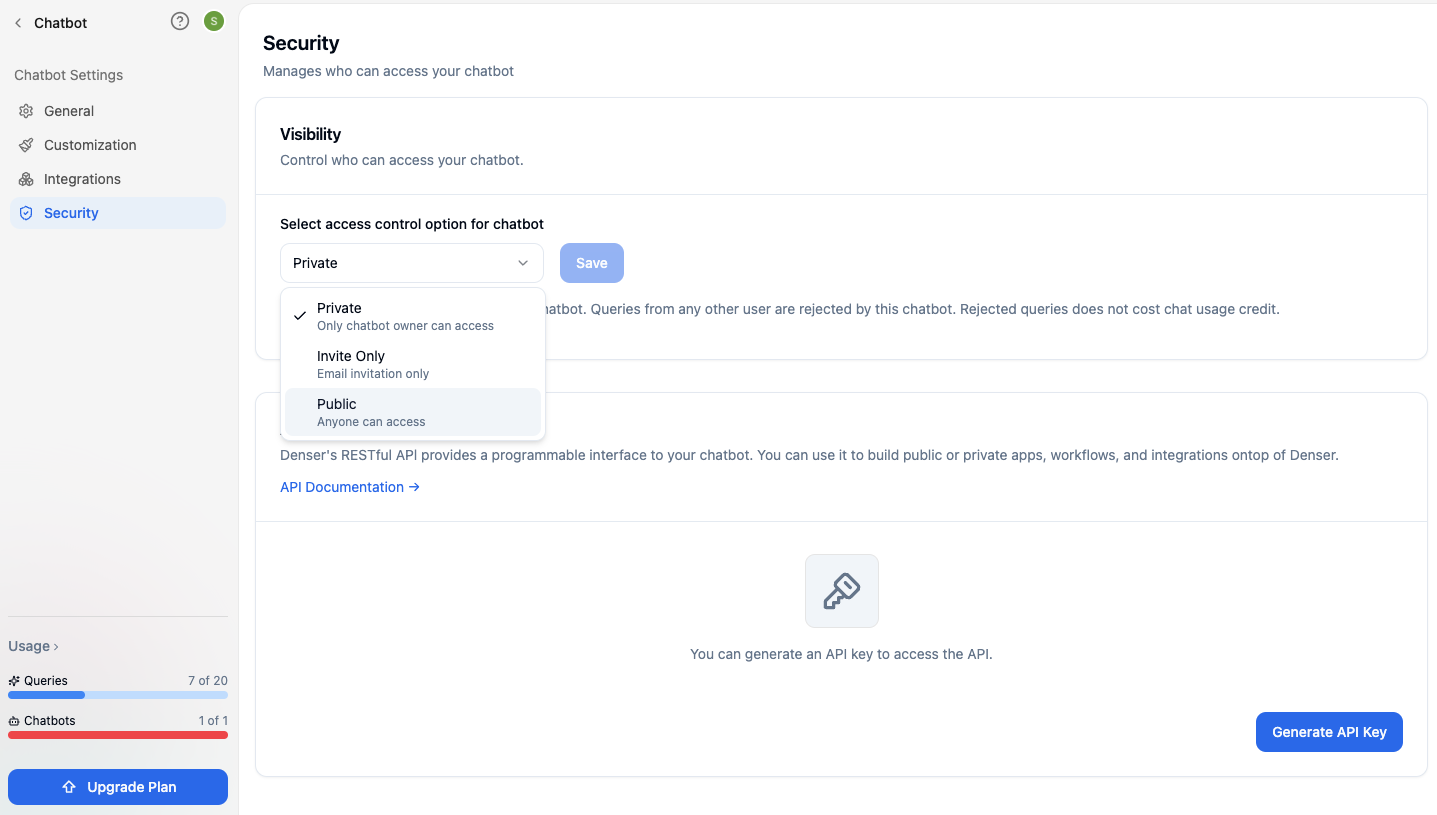
A secure search platform should support integration with your existing authentication systems (e.g., Active Directory, SSO, OAuth) to align with corporate security policies. Also, it should maintain an audit trail of access logs to ensure transparency and compliance.
Natural Language Processing#
Not everyone uses the same words to ask the same question. Enterprise search powered by NLP interprets how users phrase their queries. It understands synonyms, abbreviations, and incomplete terms.
This allows users to search in a conversational way rather than guessing exact keywords, improving both accuracy and accessibility, especially for non-technical users. Some platforms also support voice queries and multilingual input that extends usability across regions and departments.
AI-Powered Ranking and Personalization#
Advanced enterprise search systems incorporate machine learning to constantly improve relevance. The system learns from user behavior, including clicks, time spent on results, and search refinements.
AI helps rank content by importance, recent activity, popularity, and contextual factors, such as the user’s role or past searches. This dynamic ranking ensures that the most valuable information appears at the top.
Faceted Navigation and Advanced Filtering Options#
Enterprise search platforms offer faceted navigation, which allows users to filter results based on content type, date, author, department, tags, or data source.
These filters are often customizable and can be tailored to the unique needs of each organization. This feature is useful when dealing with thousands of documents or records.
Scalability and High Performance#
An enterprise search solution should be designed to scale as your organization grows. It must handle increasing volumes of data and user traffic without compromising speed or accuracy.
If you’re indexing millions of documents or serving thousands of users across departments and locations, the system should maintain high uptime, fast indexing speed, and low-latency search results.
Cloud-based or hybrid deployments can further improve scalability and reduce infrastructure burdens on your internal IT teams.
Analytics, Reporting, and Search Intelligence#
Understanding how people use your search system can uncover valuable insights. Built-in analytics dashboards can show what users are searching for and where they’re struggling to find information.
This helps administrators identify content gaps, optimize the system, and improve the overall user experience. Reports on failed searches or underused data sources can also inform future content strategy and training needs.
Integration With Enterprise Tools and Workflows#
A search tool that sits outside your daily workflow isn’t useful. Enterprise search should integrate seamlessly with the tools your teams already have.
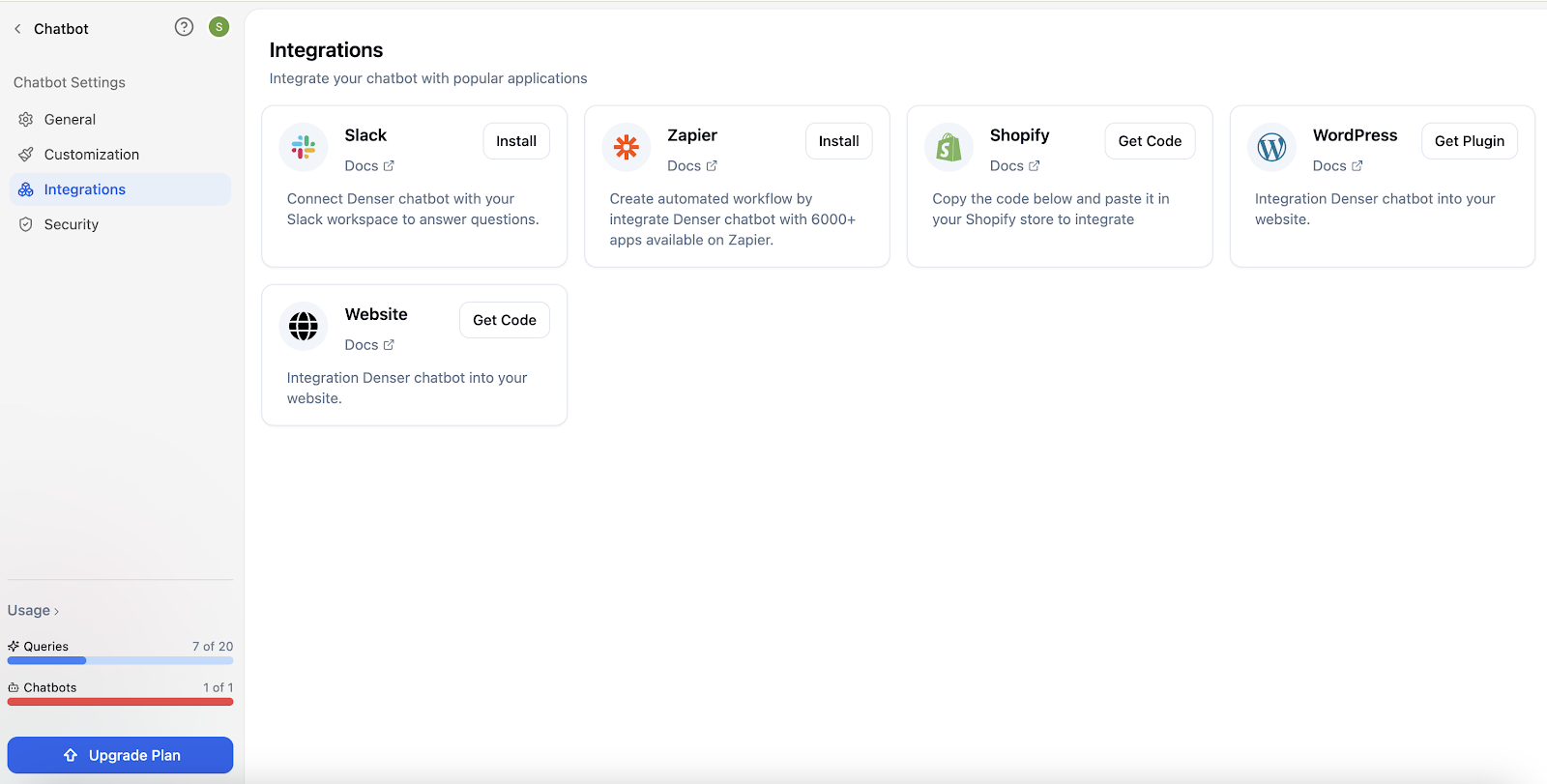
Some systems offer browser extensions, Slack/Microsoft Teams integrations, and API access so users can search directly within their preferred tools or embed search results into custom dashboards and applications.
Benefits of Implementing an Enterprise Search Tool#
Implementing an enterprise search tool is one of the most impactful steps a business can take to improve internal efficiency, collaboration, and decision-making.
A powerful enterprise search solution solves that problem by bringing clarity, speed, and structure to your organization’s knowledge base.
- Quick access to information from all systems in one place
- Boosts employee productivity by reducing time spent searching
- Improves decision-making with faster access to accurate data
- Breaks down silos and supports better cross-team collaboration
- Reduces support tickets by enabling self-service across teams
- Preserves knowledge even when employees leave or switch roles
- Enforces data security with role-based access controls
- Scales with your business as data and teams grow
- Creates a consistent user experience across tools and platforms
- Gives your business a competitive edge with faster, smarter responses
When the right information is easy to find and accessible to the right people, you create a more agile, informed, and empowered workforce.
Use Cases of Enterprise Search#
Enterprise search solutions offer valuable benefits across various industries and scenarios. Here are some practical use cases specifically for ecommerce, retail, websites, and workplace search:
Ecommerce & Retail#
In ecommerce, enterprise search helps businesses manage and retrieve product information, customer reviews, and sales data. Advanced semantic search capabilities enable natural language queries that understand customer intent beyond simple keywords.
Store managers and marketing teams can quickly find insights into product performance and customer preferences. This leads to better customer service, optimized stock management, and informed decision-making on promotions and pricing strategies.
Websites#
Visitors can find articles, videos, and other content using advanced search capabilities on the search bar. Website administrators can also use search data to understand user behavior and improve customer engagement by surfacing relevant content.
Product Catalog Management#
You can maintain up-to-date product listings, descriptions, and specifications so that customers have accurate information. This reduces the likelihood of errors and improves the overall shopping experience.
Customer Support#
Customer support teams benefit from enterprise search by accessing a comprehensive knowledge base of FAQs, troubleshooting guides, and customer history. This allows support representatives to resolve issues to improve customer satisfaction and reduce support costs.
Workplace Search#
Employees can find the necessary information to complete their tasks without wasting time sifting through multiple databases. An intelligent workplace improves collaboration, speeds up project timelines, and supports a more efficient work environment.
Content Management Systems (CMS)#
Websites using CMS platforms like WordPress or Drupal can integrate enterprise search to manage and retrieve content. Editors and writers can find past articles, media files, and other resources to simplify the content creation and publishing.
Internal Knowledge Bases#
Workplaces with extensive internal knowledge bases use enterprise search to provide employees with quick access to company policies and technical documentation. Internal search supports employee onboarding, continuous learning, and efficient problem-solving.
Top Enterprise Search Solutions in 2025#
Choosing the best enterprise search solution can be challenging, with many available options. Here are some of the enterprise AI search platforms in 2025, each offering unique features and benefits:
1. Denser.ai#
When it comes to enterprise search, most solutions either struggle with scattered results or lack the intelligence to understand the context. Denser.ai is built to solve both of those challenges, delivering fast, accurate, and deeply relevant answers to your internal questions.
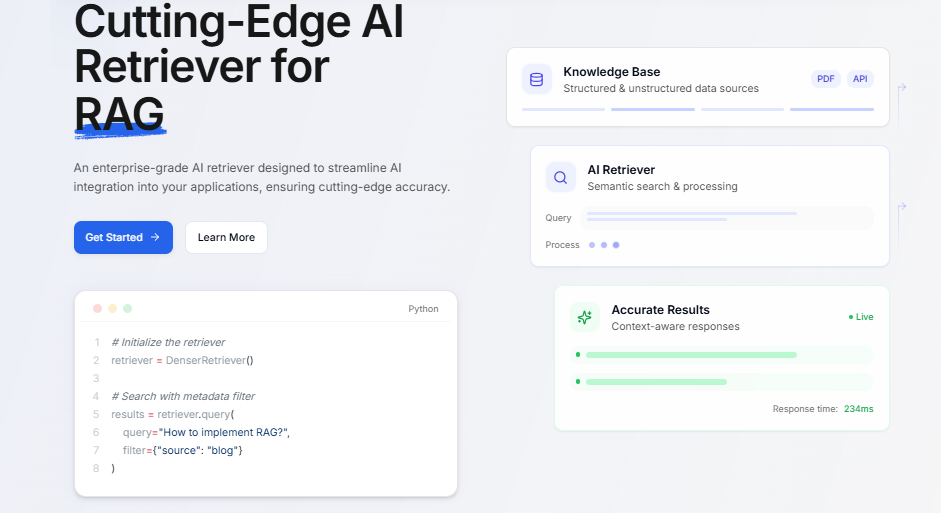
It goes beyond traditional search by using advanced retrieval-augmented generation (RAG) to pull information from across your private data sources and respond with clarity.
Denser's Key Features:
- Uses machine learning to deliver precise and relevant site search results
- Understand the context of queries to provide accurate answers
- Easily handles growing data volumes and user numbers without compromising performance
- Integrates with various business applications, including CRM, ERP, and document management systems
- Ensures data privacy and meets regulatory standards
- Allows businesses to tailor the search experience to their specific needs
Denser Retriever is designed for businesses that rely on large volumes of information but don’t want the complexity of traditional document search tools.
Rather than offering a list of links or partial matches, Denser returns direct, conversational answers to make your internal content actionable.
It connects with a wide range of tools, including Google Drive, Notion, Confluence, Slack, and custom databases, so you can unify knowledge across your entire organization in minutes.
Denser.ai combines advanced AI technology with a user-friendly interface, making it an ideal choice for businesses of all sizes. Here's a brief overview of our pricing plans:
- Free plan: Includes 1 DenserBot, 20 queries per month, and up to 100 documents or 50MB of storage.
- Starter ($19/month): Get 2 DenserBots with 1,500 queries per month, API access, and 30-day log history. Each bot supports up to 100 documents.
- Standard ($89/month): Includes 4 DenserBots and 7,500 monthly queries. Each bot can handle up to 2,000 documents, plus you get advanced features like branding removal.
- Business ($399/month): Supports 8 DenserBots, each indexing up to 10,000 documents or 5GB of data. It includes all standard features, longer log retention and accuracy support.
- Enterprise (Custom pricing): For larger teams or specific needs, custom plans are available with expanded limits and tailored support.
Each plan offers a 35% discount if you opt for annual billing.
With Denser, you don’t need complex setup or technical expertise. Just connect your data, and your teams can start asking questions and getting real answers instantly.
Request a product demo or sign up for a free trial today!
2. Elasticsearch#
Elasticsearch is a distributed, RESTful search and analytics engine built on Apache Lucene. It enables users to store, search, and analyze large volumes of data quickly and in near real-time.
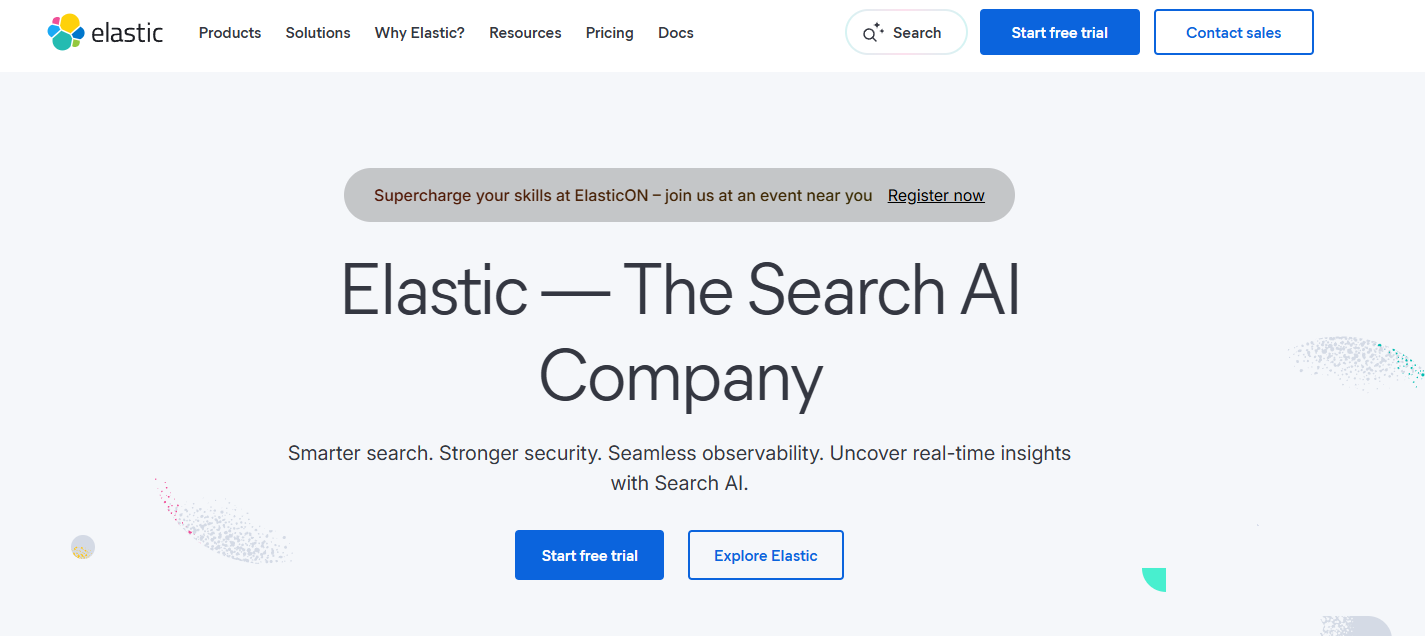
Image Source: elastic.co
Its key features include full-text search capabilities, support for structured and unstructured data, and scalability through distributed computing. Elasticsearch's architecture allows for horizontal scaling to handle large amounts of data by distributing it across multiple nodes.
Pros#
- Real-time search and analytics
- High scalability
- Advanced search capabilities, including natural language processing
- Extensive customization options
Cons#
- Requires technical expertise to set up and manage
- Limited out-of-the-box features for non-technical users
3. Microsoft Azure Cognitive Search#
Microsoft Azure Cognitive Search is a cloud-based search-as-a-service solution for developers to integrate sophisticated search capabilities into their applications without managing infrastructure.
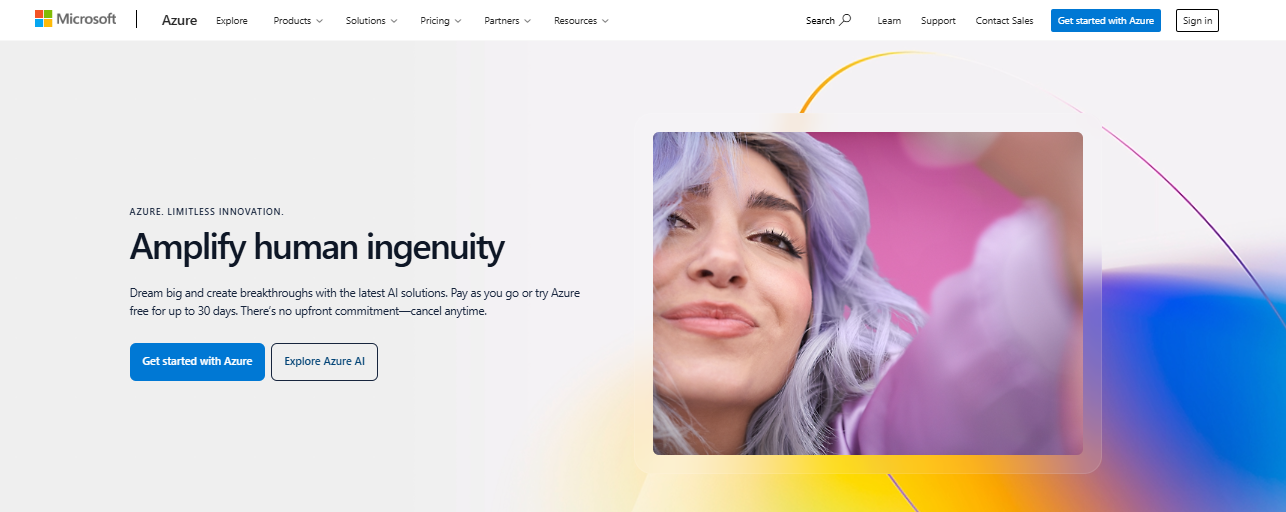
Image Source: azure.microsoft.com
It allows for the ingestion of data from various sources, including Azure Blob Storage, SQL databases, and Cosmos DB. The platform supports both full-text and filtered searches.
Pros#
- AI-powered search and insights
- Easy integration with Microsoft Azure services
- Built-in security and compliance features
- Scalable and flexible
Cons#
- Can be expensive for smaller businesses
- Best suited for businesses already using Microsoft Azure
4. Sinequa#
Sinequa is an AI-powered search platform designed to help organizations access and analyze vast amounts of data. It offers a comprehensive framework with configurable features so users can connect to diverse content sources and index content in various formats.
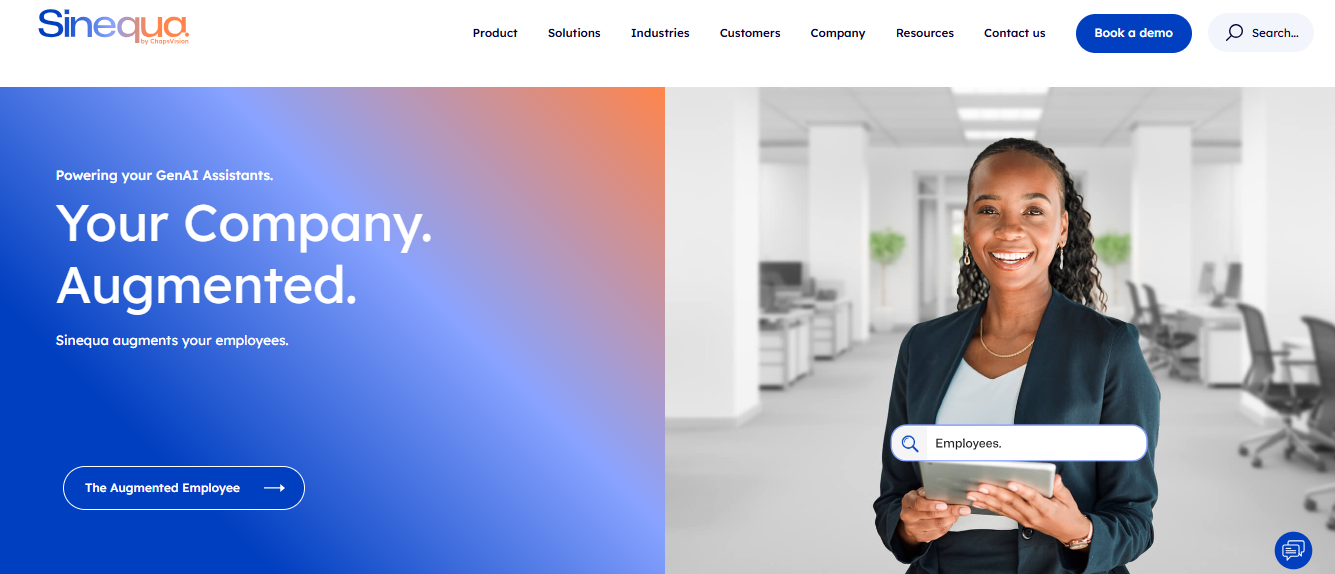
Image Source: sinequa.com
The platform's advanced NLP and machine learning capabilities improve content enrichment.
Pros#
- Unified search platform with AI and analytics
- Advanced linguistic and semantic analysis
- Scalable and customizable
- Strong data security and compliance
Cons#
- Higher cost and complexity
- Best suited for large enterprises
5. Coveo#
Coveo is an AI-powered relevance platform that boosts search, recommendations, personalization, and merchandising within digital experiences. It integrates with over 100 content sources to unify and index diverse data.
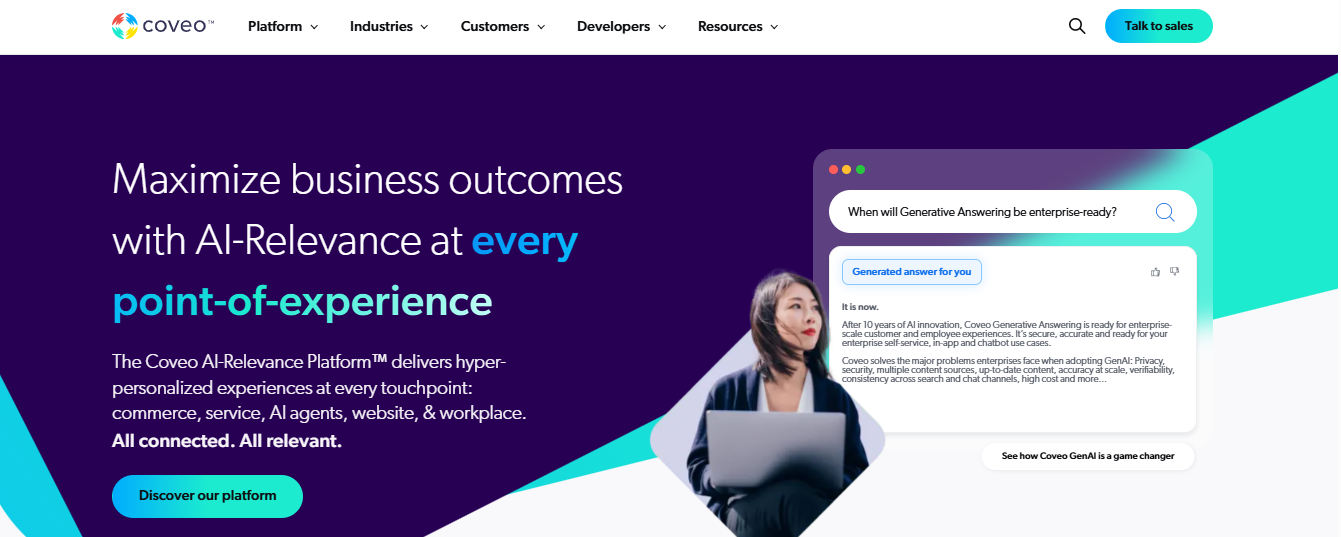
Image Source: coveo.com
The platform's machine learning capabilities enable it to deliver personalized experiences by understanding user intent and behavior.
Pros#
- Strong personalization and analytics
- Integrates with many business tools
- Scalable and secure
Cons#
- Can be complex to set up
- Higher cost compared to some other solutions
Improve Your Business With Denser.ai's Enterprise Search Solutions!#
Sifting through disconnected systems, folders, and knowledge bases wastes valuable time and may slow down decision-making.
Traditional enterprise search tools often return fragmented results that leave teams hunting for clarity. Denser changes that.
It’s an AI-powered enterprise search solution built to help you find what you need the moment you need it. Denser connects to your internal tools to unify your company’s content in one intelligent search experience.
This AI enterprise search software delivers accurate, context-aware answers by using advanced retrieval-augmented generation. Your teams get real information without switching platforms or waiting on manual support.
If you’re ready to replace disconnected searches and repetitive tasks with smarter, more meaningful results, Denser is the solution built for your enterprise.
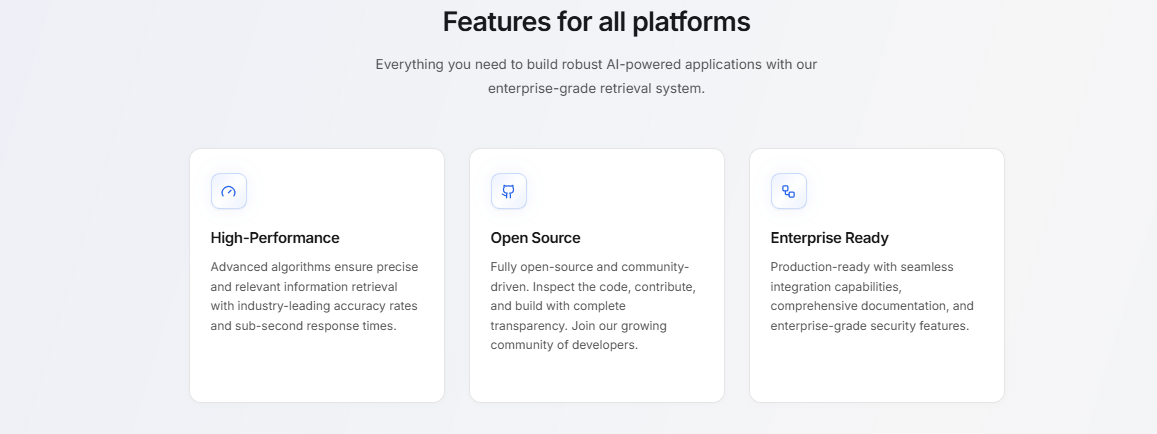
Try a free trial today or schedule a demo to see how enterprise search becomes a true competitive advantage.
FAQs About Enterprise Search Solutions#
What does enterprise search do?#
Enterprise search helps you find information across all your company’s internal systems, such as documents, emails, databases, and cloud apps.
Instead of searching each tool separately, an enterprise search engine brings everything together in one place. Many tools today also support semantic search and vector search, which help deliver better, more accurate results.
What is the difference between Elasticsearch and enterprise search?#
Elasticsearch is a tool that developers use to build search systems. Enterprise search is a ready-to-use solution that allows businesses to search for internal data.
Some enterprise search software is built on Elasticsearch but includes added features like security, user access control, and easy setup for corporate use.
What is the difference between enterprise search and web search?#
Web search tools like Google are made to search public websites. Enterprise search is built to search private, internal company data. It helps your team find the right info inside tools like CRMs, file storage, or knowledge bases.
Internal enterprise search also includes features like permissions and custom ranking that web search doesn’t offer.
Is enterprise search free?#
Some tools offer a free version, especially open-source ones like Elasticsearch. However, most full-featured corporate search software is paid, especially if you need semantic search, vector search, or integration with other business tools.
If you want the best enterprise search software, it’s usually a paid investment, but it can save your team a lot of time and effort.